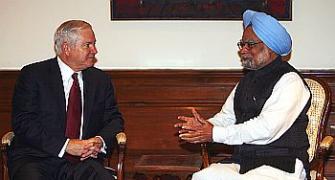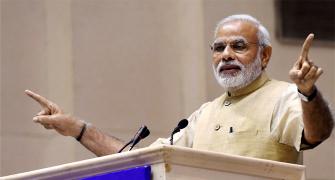United States Defence Secretary Robert Gates on Thursday ruled out the possibility of his country playing a role in facilitating the resumption of the composite dialogue between Pakistan and India, which has been stalled since the 2008 Mumbai attacks.
"I have been involved with both these countries for a very long time...and I think one thing that has been consistent throughout the past several decades is that both Pakistan and India would prefer to deal with their bilateral problems bilaterally," Gates said.
He was replying to a question during a television interview on whether the US would be willing to assist in the resumption of the composite dialogue, which was put on hold by India after attacks in Mumbai by Pakistan-based terrorists killed nearly 180 people.
Gates pointed out that he, like other American leaders who had visited the region over the past few decades, had said that 'if we could be of help to either side or both sides in any way, we would be willing to do that but understand that they (Pakistan and India) would prefer to handle it bilaterally.'
He described Al Qaida and Lashkar-e-Tayiba, blamed for the 26/11 Mumbai attacks, as dangerous groups. India, Pakistan and Afghanistan had a 'shared sense of threat' and 'all of these countries share an enemy in common and it is terrorism,' he said.
Asked about his recent comments that there were links between Islamabad and militants, Gates declined to go into specifics and only said the US is confident that the 'Pakistan government understands our concerns and understands we face a common threat.'
He said he was 'very comfortable with the partnership that we have going forward in dealing with this common extremist threat.'
Gates said the 'trust deficit' between the US and Pakistan was 'not a current or contemporary development' and was the 'outgrowth of decisions made by the US in 1989 and early 1990s' when it turned its back on Afghanistan after the end of the war against Soviet forces.
"Our perception is that if there is a trust deficit, it is more a function of Pakistan's concern whether the US is actually a long-term ally and partner for Pakistan," he said.
One purpose of his current visit to Islamabad is to tell Pakistan that 'we know we made a mistake in 1989 and the early 1990s and we are determined to be a reliable long-term partner and ally for Pakistan.'
Gates dismissed as 'nonsense' media reports about the US planning to secure Pakistan's nuclear arsenal in the event of a takeover by militants.
"We have no intention or desire to take over any of Pakistan nuclear weapons. We have no desire to occupy any part of Pakistan or split up any part of Pakistan," he said.
"We are very comfortable with the security of Pakistan's nuclear weapons," he added.
Asked if the US knew the whereabouts of Al Qaida chief Osama bin Laden, Gates replied, "I have no idea. If I knew where he was, he wouldn't be there any longer."






